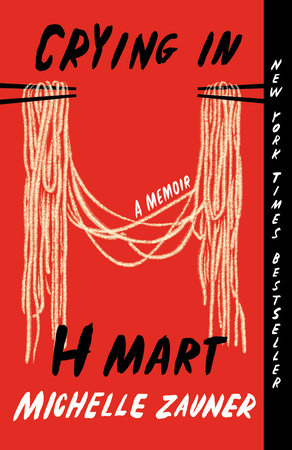Crying in H Mart Reader’s Guide
By Michelle Zauner


1. “My mother was always trying to shape me into the most perfect version of myself” (p. 18). What do Michelle’s mother’s habits and beliefs reveal about her as a mother? What value do you see in her approach to parenting, and what would you do differently?
2. How does Michelle’s relationship with her mother evolve over the course of the memoir? Compare their relationship with other parent-child relationships in the memoir and with your own experience.
3. H Marts and local supermarkets are a regular setting in the book. How do these locations shape Michelle’s experience of food and family?
4. Discuss the difficulty of communicating with family members of different generations, who speak another language and come from a different culture. How do Michelle and Nami bridge this divide?
5. Music has been a key element of Michelle’s life. How does the music that she listens to relate to the events in her life? What playlist would you put together for her family?
6. Food is a prominent motif throughout the memoir. How does the author use various food references to anchor you to specific locations, memories, and cultures? Which foods in the book were the most memorable to you and why?
7. The reader sees the local Korean community through Michelle’s eyes. How do their lives differ from Michelle’s family’s life?
8. Do you see Kye’s actions as brazen and callous, or are there aspects that are considered acceptable given her expertise? How do her actions compare to other stories or experiences of caregiving?
9. Michelle touches on various incidents of racism and alienation throughout her life, and discusses both idealizing whiteness and fearing that she is not Korean enough. What does this reveal about the complications of growing up mixed-race and with Asian heritage in America? How does it compare to Asian American representation and access to opportunities today?
10. According to Michelle, beauty is an intrinsic part of Korean culture. How has this shaped her upbringing and family dynamic? Discuss your own beauty standards and what you consider beautiful.
11. Crying in H Mart deals with caregiving for someone with a terminal illness and its aftermath. What do you think of the depiction of guilt and grief in this story?
12. How does the family’s support network show up for them during times of crisis? How would you describe the love and support of the people around them?
13. Compare Michelle’s relationship with her father and her aunt before and after her mother’s death. How have they grown closer or further apart? To what extent do blood ties matter?
14. The narrative structure of Crying in H Mart jumps between the past and the present, skipping across time with various anecdotes. How does this reflect Michelle’s reconciliation of her mother’s memory, and what do you think of her emotional journey by the end of the book?
15. Listen to “Jubilee,” the latest album by Japanese Breakfast. Which tracks stood out to you? How does the music complement the narrative in Crying in H Mart?
16. What do you think of the ending and the ways that Michelle has chosen to commemorate her mother? Do you believe in a kind of fate, that her mother is watching over her from beyond?
17. The idea of a “scarcity mentality” (p. 55) is mentioned in the book, relating to a lack of Asian and female representation in the media. Did this impact how you think about representation, cultural differences, and community building? If so, how?